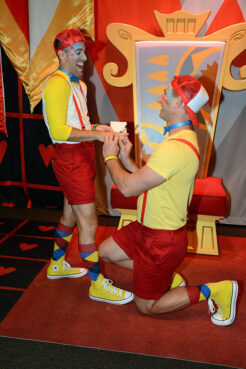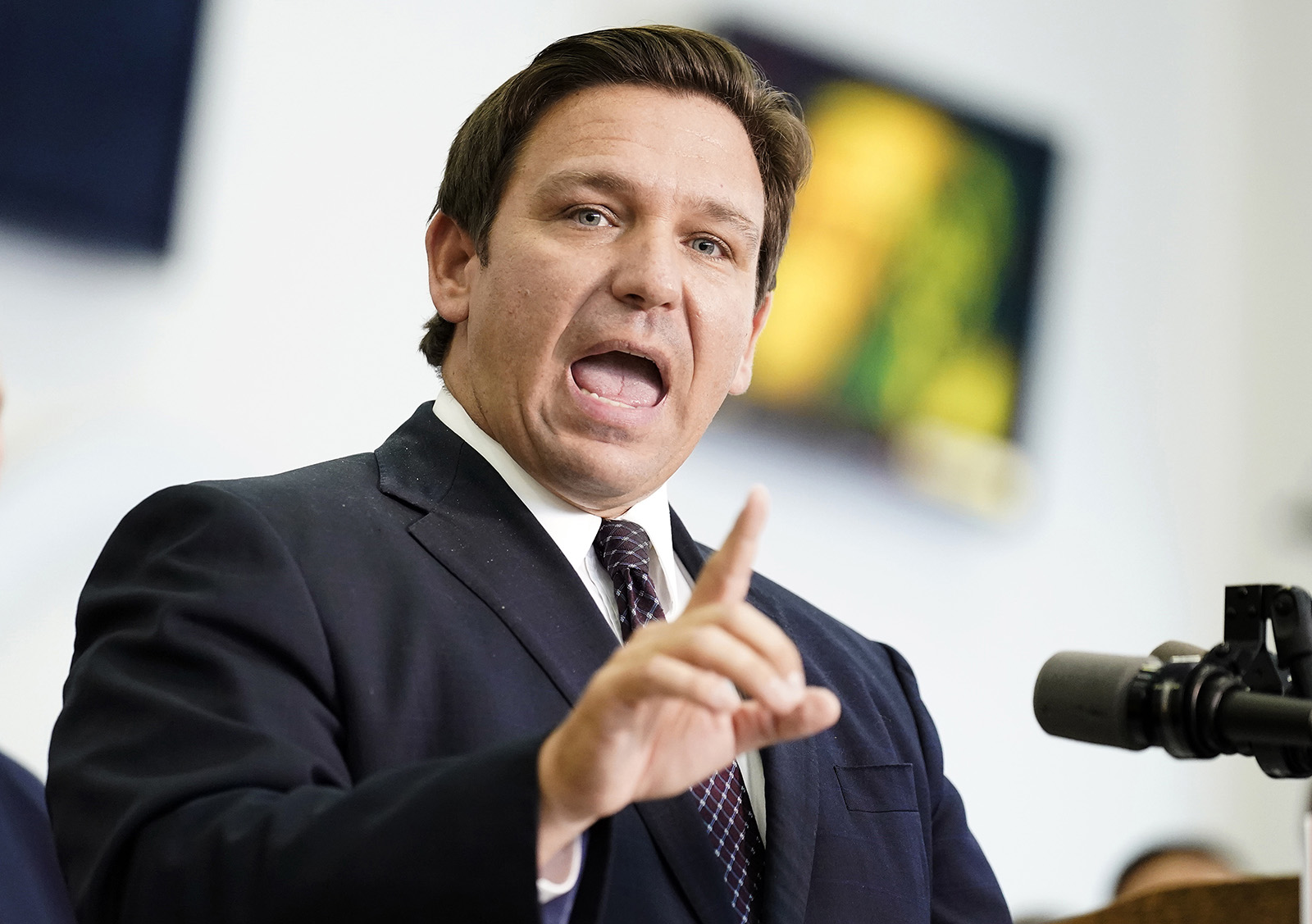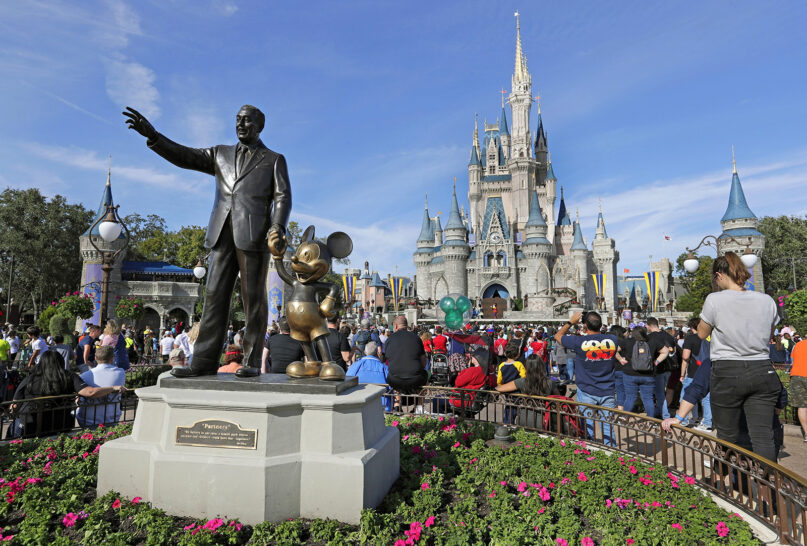(RNS) — My husband and I are huge Disney fans. We visit the Orlando-area theme parks almost monthly. In 2017, we got engaged in Hollywood Studios. We were dressed as Tweedledum and Tweedledee from “Alice in Wonderland,” and visiting the Queen of Hearts, when all of a sudden Andy dropped to his knee and presented me with a ring.
When I said “yes” and gave him a smooch, the room immediately went wild! Young, old, straight, gay, conservative, liberal, and even the Kentucky couple sitting at our table who were mistaken for our parents. The magic of that night was something I will never forget.
It was a perfect evening, and it was provided to us in large part by Disney — a company that has, for as long as I can remember, given a warm welcome to LGBT people.
Here’s just one silly example. We have these fabulous fans that we always carry around with us when we visit Disney World. One is blue and features the rooster character from the film “Moana.” It says “HEI HEI.” Another, black and purple, is decorated with Snow White’s stepmother and says “QUEEN.” Another fan shows Dr. Facilier, the villain from “The Princess and the Frog,” next to the word “SHADE.”

Andrew Swiatowicz, right, proposes to Brandon Ambrosino in Club Villain at Disney’s Hollywood Studios in Lake Buena Vista, part of the Orlando area in Florida, on Oct. 29, 2016. Photo courtesy of Brandon Ambrosino
You get it, right? While the fans don’t say gay, they definitely “say gay.” And that very ambiguity — gay and not gay at the same time; kind of like a Florida Republican you meet on Grindr who wants to have sex with you as long as you don’t call him the G-word — makes them really fun.
It also makes them a fascinating point of departure for a discussion about Florida’s infamous “Don’t Say Gay” bill.
Sponsored by Republican Sens. Dennis Baxley and Joe Harding, and signed into law in March 2022 by Gov. Ron DeSantis, HB1557 aims to “reinforce the fundamental right of parents to make decisions regarding the upbringing and control of their children.” These decisions, according to the law and its supporters, refer primarily to making sure teachers don’t discuss gender or sexual identity with children in kindergarten through third grade.
When HB1557 first started being discussed, all eyes shot to Disney — one of Florida’s largest employers. How would Bob Chapek, the new CEO, respond to the law?
At first, Chapek was quiet. Some people took note. And then those people got angry. So Chapek decided to address his silence in an early March email to Disney employees. “As we have seen time and time again, corporate statements do very little to change outcomes or minds. Instead, they are often weaponized by one side or the other to further divide and inflame.”
RELATED: Southern Baptists may cheer DeSantis’ war on Disney but don’t expect a boycott
To me, this level of empathetic and strategic leadership was insightful. It was also, sadly, prophetic. Because days later, when Chapek finally did issue a strong statement against the bill, DeSantis instantaneously weaponized his words not only against him, but against the entire Disney company. Lines were drawn. People took sides. DeSantis was praised for protecting children. Disney was condemned for “grooming” them.
“Disney’s opposition to a common-sense parental rights law,” said U.S. Rep. Scott Perry, “exposes its disturbing effort to push the radical left’s toxic ‘woke’ agenda on our country’s most vulnerable, our young children.”
Some of Disney’s new critics pointed to a March Zoom call during which Karey Burke, president of Disney’s General Entertainment Content, said she wanted Disney to work toward making at least 50% of its characters minorities or from underrepresented classes. This was taken to be a signal that Disney was caving to liberal pressure and was departing from its traditional values. Like the ones that led them to create “Pocahontas,” a 1995 film in which about 50% of the characters aren’t white. Or “Aladdin,” a 1992 film in which — with the exception of the animals and the blue guy — all of the characters are brown.
The takeaway here is that “Don’t Say Gay” supporters who are angry at “recent” changes made by a “woke” Disney company just haven’t been paying attention: Disney has long embraced inclusion and diversity in its storytelling.
But judging from their rage against Chapek, critics of the bill haven’t been paying attention, either. Really? You want the Disney CEO to clarify whether the Disney company supports LGBT people?
Where have you been?
Literally everyone knows exactly where Disney stands on LGBT issues. Have y’all ever heard of Disney World? It is incredibly, flamboyantly gay. Fairy godmothers. Witty queens. Handsome princes. Fabulous villains in designer fur. Glitter. Choreographed parades. Cocktails with glow cubes. Snobby dining. Chic hotels. Tons of LGBT cast members. A Halloween celebration that lasts for three months! Dear Lord, it doesn’t get any gayer than Disney, folks.

Florida Gov. Ron DeSantis speaks after a bill signing on Nov. 18, 2021, in Brandon, Florida. (AP Photo/Chris O’Meara, File)
RELATED: With ‘Villains’ tarot deck, Disney pushes the mystical practice further into mainstream
As Chapek put it so eloquently in his March email, the Walt Disney Co. has long been on a journey toward “a more tolerant, respectful world.” That journey, though, doesn’t take the easy route of political slogans and hastily composed statements, but rather winds “through the inspiring content we produce, the welcoming culture we create, and the diverse community organizations we support.”
Disney’s strategy here is decidedly not polemical or confrontational, and that resonates with me. My husband and I are both Catholic. I study and teach theology and ethics at an Augustinian Catholic university. I certainly encounter my fair share of anti-gay bias in religious spaces. And yet I’ve never believed the best way to challenge this bias is by engaging in angry political arguments with conservatives or shaming them on social media. I’ve always believed the best response to the silly claim “you can’t be gay and Christian” is simply to show up to church with my husband and take Communion with him.
Although Twitter tries to convince us otherwise, there are other ways — quieter ways, friendlier ways, apolitical ways — of changing the world. One of the most suffocating ideas of this cultural moment is that politics ought to have the final word on everything, that the only way to change something is by making a law about it. That is entirely wrong. Life is so much bigger than politics, and we need to figure out how to put the latter back in its place.
We need to relearn how to relate to each other without thinking about the politicians we or they voted for. The question we should be concerned with is “Who is my neighbor?” and not “Who is my neighbor’s candidate?” The second question is not only uninteresting, but more often than not, we allow the answer to justify our meanness.
Similarly, the question “What has Disney said publicly about DeSantis’ new law?” is a much less important question to ask than “How does Disney treat its LGBT guests and employees?”
I don’t need Chapek to publicly condemn DeSantis’ politics so I am able to feel valued as a gay man. I feel that way every time I set foot on Disney property, every time I walk down Main Street holding Andy’s hand, every time I cool myself off in front of Cinderella Castle with one of my fabulous Disney fans.
Who cares what the politicians are screaming about outside Disney World? In Mickey’s kingdom, we say gay. Even when we don’t.
(Brandon Ambrosino is a doctoral candidate in theology at Villanova University. He has written for Politico, The New York Times, The Boston Globe, BBC, The Globe and Mail, and other outlets. He lives in Newark, Delaware, with his husband, Andy. The views expressed in this commentary do not necessarily reflect those of Religion News Service.)





